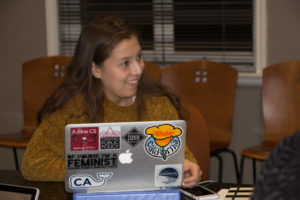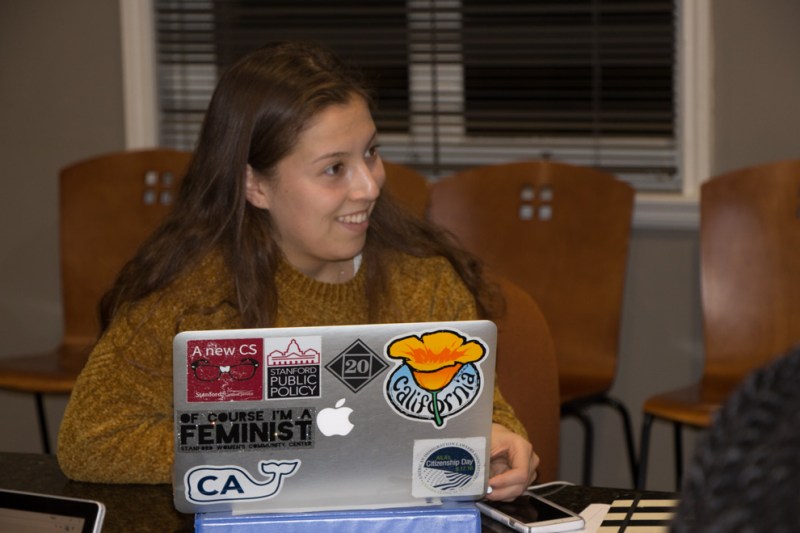During its 15th meeting, the 19th Undergraduate Senate heard Eduardo Ochoa, an irrigation specialist on Stanford’s campus, speak about the importance of professional development opportunities for Stanford employees.

Student Life committee chair Lizzie Ford ’20 invited Ochoa and his family to the Senate meeting to recount his experience with Habla, a student-led organization dedicated to tutoring Stanford janitorial staff in English literacy.
Ochoa, who has been a part of the Land, Buildings and Real Estate (LBRE) department for 17 years, was skeptical about joining Habla at first; but after hearing about coworkers’ success in working with Habla, he decided to enroll in the program himself.
Ochoa told Senate that he credits Habla for the growth in his communication skills, both in his career and his personal life. According to Ochoa, Habla helped him communicate better with his supervisor, who prefers to be contacted via text message or email.
Working with HABLA for nearly two years also gave Ochoa the skillset to translate his pastor’s Spanish sermons for English churchgoers – he said that being a translator is now one of his passions.
Ochoa said that Habla also gave him the courage to pursue what he once saw as unattainable goals.
“It took me almost six months,” Ochoa said, as he unzipped his jacket to reveal his cleric uniform to the Senate audience. “But as you can see, thanks to them, I was able to become a chaplain.”
After giving his personal testimony, Ochoa appealed to Senate for support in petitioning the University to institutionalize professional development programs like Habla.
“Since I have benefitted from this training program, I am here to ask [Senate’s] support in asking Stanford to allow all service workers on campus to benefit from training like this,” Ochoa said. “We are asking Stanford to invest in its workforce by creating a training and development plan for each department.”
Together with Stanford Human Resources and Francisco Preciado, executive director of the campus worker’s union SEIU Local 2007, Ford wrote a proposal asking the University to make structured professional development plans for individual departments such as LBRE and Residential and Dining Enterprises. The proposal specifies certain programs they believe should be implemented, such as an apprenticeship program for English-proficient workers and a concerted effort to give service workers a timeslot to pursue vocational development.
“The main goal is to get Stanford to agree to release workers from each department at specific times and ensure their education isn’t disrupted,” said Preciado.
Preciado also noted that Stanford service workers face other challenges, such as chronically understaffed workplaces and their status as hourly wage workers rather than salaried employees who receive benefits.
Senate Chair Kojoh Atta ’20 said he seeks to support Stanford’s service workers, as they remind him of the “human element” that the Senate strives to consider.
Ford said that a joint resolution regarding student-led initiatives to improve professional development will be proposed to the Senate in January.
In addition, Senate discussed the ongoing Faculty Senate review of the Ways of Thinking/Ways of Doing (WAYS) requirements, which emphasize a broad-based liberal arts educational experience at Stanford. ASSU Executive Justice Tention ’18 said he recently met with Harry Elam, Vice Provost for Undergraduate Education, to discuss whether or not the four-year-old WAYS program has met certain benchmarks for success.
In response to other senators’ concerns with WAYS – for instance, students cannot petition to receive WAYS credit for uncertified classes – Tention said that Elam and the executive cabinet reviewing WAYS were not currently looking at “granular issues.” Instead, WAYS will be evaluated under much broader criteria.
“[The Faculty Senate] is first trying to establish: What were the benchmarks for success, were they met, and how has the student body changed?” said Tention.
More specifically, the committee reviewing WAYS requirements will evaluate the performance of the Class of 2017 – the first cohort to complete the WAYS requirements – as well as examine feedback about advising and academic options and review training protocol for TAs. The goal of the review is to consider accessibility, sensitivity training and other needs of the Stanford student body.
Contact Melissa Santos at melissasantos ‘at’ stanford.edu.
